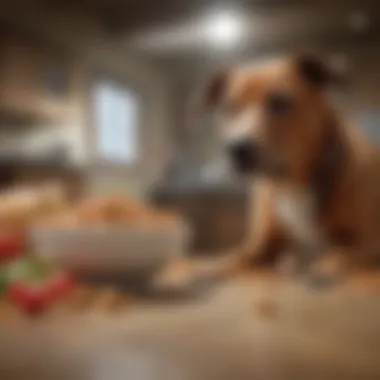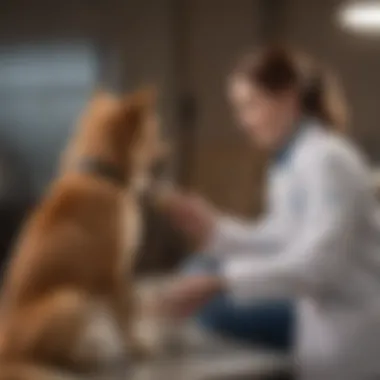Nutritional Guidance for Dogs with Diarrhea and Vomiting


Intro
Managing a dog experiencing diarrhea and vomiting requires careful attention to nutrition and hydration. In these moments, owners must respond with appropriate dietary measures to address the dog’s needs. Both diarrhea and vomiting can lead to dehydration, so understanding how to best support recovery is crucial. This article will elaborate on effective nutritional strategies and potential safe feeding options. It’s key to identify what may have caused the gastrointestinal distress in the first place, which will inform the best approach to care.
Understanding Your Pet
When dealing with a pet in distress, it's essential to take a closer look at their characteristics. Each breed can react differently to illness, and being aware of these traits can guide the owner’s approach to diet and care. Moreover, understanding a dog's unique temperament could assist in managing their stress levels during recovery.
Breed Traits
Certain dog breeds are more prone to gastrointestinal issues. For instance, toy breeds such as Chihuahuas might experience digestive upset more readily than larger breeds. It's invaluable to consider a specific breed's predispositions when evaluating how they cope with health challenges.
Common Temperaments
How a dog behaves can influence their recovery from digestive problems. An anxious dog may experience a longer recovery time due to stress. Conversely, calm dogs might handle dietary changes with less resistance. Owners should monitor their pets closely and adjust their environment and feeding strategies accordingly.
Special Needs
Some dogs, such as those with existing health conditions like pancreatitis, require specialized nutrition during recovery. Consulting a veterinarian about any special needs can ensure that dietary adjustments are appropriate and safe.
Pet Care Essentials
To ensure a pet recovers quickly from gastrointestinal issues, attention to detail in care essentials is necessary. Proper nutrition and feeding guidelines play a central role here.
Nutrition and Feeding Guidelines
When a dog suffers from diarrhea or vomiting, withholding food for 12 to 24 hours may be advised. This allows the digestive system to settle before gradually reintroducing food. Start with a bland diet consisting of boiled chicken and white rice or boiled potatoes. It's crucial that portions are smaller than usual to monitor tolerance.
Ensure to provide ample fresh water to prevent dehydration during this time.
Grooming Tips and Techniques
For pet owners, clean grooming practices are vital, especially in times of illness. Regular brushing can help prevent skin infections and other issues that may arise if the dog is less active and more focused on its gastrointestinal distress.
Health and Wellness
Maintaining general health is paramount. Regular vet check-ups help catch underlying issues that might contribute to vomiting and diarrhea. A proactive approach to wellness can reduce the likelihood of these health problems recurring.
Training and Behavior
While training might not be the primary focus during illness, understanding and managing behavior can still be significant.
Basic Training Techniques
If anxiety or stress arises from being ill, comforting commands like 'sit' or 'stay' can instill a sense of calm. These should be reinforced gently, without adding any pressure.
Behavioral Problems and Solutions
Some dogs may react to nausea by exhibiting behavioral changes. Observing these behaviors can provide insights into their discomfort level and help guide care.
Mental Stimulation Activities
When unable to go on walks or enjoy outdoor activities, directing focus to low-energy mental games can keep a dog's mind stimulated. Simple toys or puzzles might serve as a distraction.
Engaging with Your Pet
The emotional bond between pet and owner can be a healing factor.
Interactive Games and Toys
While recovery is underway, structured yet simple games can help maintain engagement with the pet without overwhelming it.
Safe Outdoor Activities
Limited outdoor interactions can occur once the pet shows signs of improvement. Short, calm walks are beneficial.


Family-Friendly Pet Interactions
During recovery, family members can engage gently with the dog to maintain a supportive environment. It’s beneficial for both the pet's mental recovery and the household's morale.
Pet Adoption and Integration
If you're considering bringing a new pet into your home, knowing the signs of gastrointestinal distress is important. Ensuring they are well and adapting can set the groundwork for a healthy experience.
Choosing the Right Pet for Your Lifestyle
Assessing a pet's potential health issues or dietary needs can help prepare potential owners for integration challenges.
Preparing Your Home for a New Pet
A welcoming and safe environment is necessary for any pet, especially one that might have a tormented past with health.
Tips for Smooth Prelude
Fostering patience and understanding during the settling-in period will allow any new pet to adjust to its surroundings with ease.
In summary, managing a dog through episodes of diarrhea and vomiting involves understanding their unique needs and maintaining proper care standards. With good nutrition, care practices, and attention to both physical and emotional health, pet owners can ease their recovery and contribute positively to their overall well-being.
Understanding Canine Gastrointestinal Distress
Gastrointestinal distress in dogs can be distressing for both the pet and the owner. Understanding its underlying causes and manifestations is essential for effective management. This section delves into the common causes of diarrhea and vomiting, and discusses the signs that pet owners should monitor to provide the best care possible.
Common Causes of Diarrhea and Vomiting
Diarrhea and vomiting can stem from various issues. It's crucial to recognize these causes to determine the best approach for treatment.
- Dietary indiscretion: Many dogs are prone to eating unsuitable items, leading to an upset stomach. This could include garbage or food meant for humans.
- Infections: Viruses, bacteria, or parasites can cause intestinal upset. Canine parvovirus, for example, is particularly concerning and can be deadly without prompt care.
- Food allergies or sensitivities: Some dogs may not tolerate certain ingredients in their food, leading to distress. Common allergens include beef, chicken, and gluten.
- Chronic health conditions: Issues such as pancreatitis or inflammatory bowel disease can cause ongoing gastrointestinal problems that necessitate long-term management.
Identifying the specific cause is a first step in formulating a recovery strategy.
Signs to Monitor in Your Dog
Being observant of your dog's behavior is key to effective care during gastrointestinal distress. Here are some signs that you should keep an eye on:
- Frequency of vomiting or diarrhea: More than twice in a short period can indicate a need for veterinary attention.
- Physical symptoms: Look for bloating, lethargy, or a hunched posture, which can suggest pain or discomfort.
- Changes in appetite: A sudden aversion to food or water can be a warning sign. Conversely, excessive thirst may indicate dehydration.
- Fever: Elevated body temperature can signal infection. This may require a veterinary evaluation.
Prompt attention to these signs can facilitate a more effective treatment and ensure the well-being of your dog.
Understanding these aspects of canine gastrointestinal distress provides a solid foundation for the necessary steps to take when a dog experiences diarrhea and vomiting. Taking note of the causes and signs can significantly aid in recovery.
Initial Steps to Manage Your Dog’s Condition
Managing a dog’s gastrointestinal distress effectively begins with prompt and informed actions. When dogs experience diarrhea and vomiting, it is essential to take initial steps that focus on their immediate health needs. This not only aids in quicker recovery but also can prevent further complications. A proactive approach instills a sense of responsibility in pet owners, ensuring that they are prepared to act when symptoms arise. Understanding when and why to consult a veterinarian, adjust feeding routines, and prioritize hydration forms the basis of a comprehensive care strategy.
Consulting Your Veterinarian
Consulting your veterinarian should be one of the first steps taken when your dog shows signs of diarrhea or vomiting. The expertise of a veterinarian is crucial in understanding the underlying causes of these symptoms. Diarrhea and vomiting could stem from various origins, including dietary indiscretions, infections, or underlying health issues. Each case varies, and only a professional can offer tailored guidance. Your vet may recommend diagnostic tests to determine the cause more accurately, allowing for a more effective treatment plan. They can also provide insights on how to manage your dog's specific condition and recommend suitable dietary adjustments.
Withholding Food: When and Why
Withholding food may be necessary for a period of time, but the decision should not be made lightly. Many vets suggest withholding food for 12 to 24 hours as it allows the gastrointestinal tract to rest. This practice can help in reducing the frequency of vomiting and give your dog’s digestive system time to recover. However, it is critical to monitor for signs of dehydration during this period. Dogs still need access to fresh water, as maintaining hydration is crucial to prevent further health issues. After the withholding period, reintroducing food gradually can help identify which foods your dog can tolerate well.
Hydration: Importance and Methods
Hydration is one of the most vital considerations when dealing with diarrhea and vomiting. Dehydration can develop rapidly, leading to more severe health complications. Therefore, it is essential to ensure that your dog has continuous access to clean water.
Several methods can help maintain hydration:
- Electrolyte solutions specifically designed for pets can be beneficial. These solutions can help replenish lost minerals.
- Ice chips may entice a dog to drink who is reluctant to consume water directly. Allowing them to lick ice chips is a gentle way to encourage fluid intake.
- Chicken or beef broth (low sodium) can also serve as an appetizing alternative to plain water, thus providing hydration while offering some flavor.
Proper hydration is key to successful recovery, so paying close attention to your dog’s fluid intake is essential during this period.
Important: Always consult with your veterinarian before administering any rehydration solutions or introducing new liquids into your pet's diet, particularly during episodes of gastrointestinal distress.


Dietary Recommendations for Recovery
Dietary choices play a critical role in the recovery process for dogs suffering from diarrhea and vomiting. These conditions can quickly lead to dehydration and nutrient deficiencies if not managed properly. Implementing suitable dietary recommendations is vital to address the underlying issues and support the dog’s health during recovery. Selecting the right foods can help soothe the gastrointestinal tract and ensure adequate nutrient intake. In this section, we will explore various diets and specific food options that are beneficial during recovery.
Bland Diets: What to Include
A bland diet is often the first step in managing gastrointestinal distress in dogs. The aim is to provide nourishment that is easy on the stomach, minimizes irritation, and facilitates recovery. Typically, a bland diet consists of simple, easily digestible foods that supply necessary carbohydrates and proteins without aggravating the stomach.
Some common components of a bland diet include:
- Boiled chicken without skin or bones
- Plain, white rice
- Pumpkin puree
It is essential to avoid processed foods, which can contain additives and preservatives that may worsen the condition. Gradually reintroducing regular diet is encouraged as the dog's condition improves.
Safe Foods for Dogs with Gastrointestinal Issues
Boiled Chicken
Boiled chicken serves as an excellent protein source. It is lean and easily digestible, which makes it suitable for dogs undergoing gastrointestinal distress. This food option keeps the energy levels stable without adding unnecessary fats or oils.
One key characteristic of boiled chicken is its simplicity and palatability. Dogs often find it appealing, promoting better food intake when they are feeling unwell. Additionally, chicken is a good source of essential amino acids that support recovery.
However, some dogs may have allergies to chicken, so close monitoring is recommended during the introduction of this food.
Plain Rice
Plain rice is another safe option, acting as a binding agent in the digestive tract. Its starchy nature helps firm up stools and provides energy. White rice is particularly advantageous due to its digestibility.
The major advantage of plain rice is its hypoallergenic quality. It is less likely to cause stomach upset compared to other grains or more complex foods. However, it lacks nutrients in isolation, so pairing it with protein sources is vital for balanced recovery.
Pumpkin Puree
Pumpkin puree is a beneficial addition due to its fiber content, which aids in digestion. It helps regulate bowel movements by absorbing excess moisture, making it effective for both diarrhea and constipation. Pumpkin is naturally low in calories, which makes it a safe choice even for dogs that need to manage their weight.
It is important to use plain canned pumpkin or fresh pumpkin puree, avoiding those with added sugars or spices. While pumpkin puree is safe for most dogs, it should be introduced gradually to prevent any potential gastrointestinal disturbances.
Foods to Avoid During Episodes of Distress
During episodes of diarrhea and vomiting, certain foods should be strictly avoided to prevent exacerbating the condition. Understanding what not to feed your dog is just as crucial as knowing safe options.
Rich, Fatty Foods
Rich, fatty foods can be detrimental to a dog’s upset stomach. These foods can lead to more severe gastrointestinal problems, such as pancreatitis. They are difficult for dogs to digest and can aggravate already sensitive stomachs.
Moreover, fatty foods often contain excessive calories, which can lead to further health issues like obesity if consumed over time.
Dairy Products
Dairy products, while enjoyable for many dogs, can be hard to digest, especially during gastrointestinal upset. Many adult dogs are lactose intolerant, leading to bloating and further discomfort.
Avoiding dairy helps to prevent additional complications during recovery. Always limit exposure to these items when your dog is experiencing distress.
Spices and Seasonings
Spices and seasonings can be harmful and irritating to a dog’s gastrointestinal system. Ingredients like garlic and onion are toxic to dogs. Furthermore, the addition of flavors and excessive salt can lead to dehydration and worsen the symptoms.
In summary, maintaining a clear focus on appropriate dietary recommendations during recovery is essential to ensure your dog’s wellbeing. Both the inclusion of safe foods and the omission of harmful items contribute to achieving this aim.
Natural Remedies and Supplements
Natural remedies and supplements can play a significant role in addressing the nutritional needs of dogs facing gastrointestinal issues such as diarrhea and vomiting. This section will touch on critical aspects, offering insights on how these elements can complement traditional veterinary care. While it's always important to consult with a veterinarian, understanding the benefits and considerations of these remedies is valuable for pet owners.
Probiotics: Pros and Cons
Probiotics are beneficial bacteria that can significantly aid in restoring gut health. These microorganisms help balance the intestinal flora, which is often disrupted during episodes of diarrhea and vomiting.
Benefits of Probiotics:


- Restores gut flora: Probiotics help replenish beneficial bacteria lost during distress.
- Supports digestion: They improve digestion by enhancing nutrient absorption.
- Reduces inflammation: Some strains can help lower gut inflammation, providing relief.
- Boosts immunity: A healthy gut flora contributes to stronger immune defenses.
On the other hand, there are some considerations regarding the use of probiotics.
- Strain specificity: Not all probiotic strains are suitable for all conditions.
- Quality matters: Choose high-quality products from reputable manufacturers to ensure efficacy.
- Possible side effects: Some dogs may experience gas or bloating.
Consult with your veterinarian on the type and dosage of probiotics before introducing them into your dog's diet.
Electrolyte Solutions for Rehydration
Electrolyte solutions are vital for dogs suffering from diarrhea and vomiting as they help restore essential minerals and fluids lost during these episodes. Maintaining hydration is crucial for recovery and overall health.
Why Electrolyte Solutions are Important:
- Replenishes lost fluids: Helps restore hydration quickly, especially in cases of severe vomiting or diarrhea.
- Balances electrolytes: Restores critical electrolytes like sodium, potassium, and chloride, which are essential for normal cellular function.
- Improves recovery speed: Proper hydration can lead to faster recovery times and a reduced risk of serious conditions like dehydration.
Methods of Administration:
- Commercial solutions: Products like Pedialyte are often recommended for pets, but choose those without added sugars or artificial flavors.
- DIY solutions: A simple homemade solution can be made with water, a small amount of salt, and sugar. However, specific measurements are important to avoid imbalances.
Remember: Consult your veterinarian before administering any electrolyte solutions to ensure they are appropriate for your dog's particular condition.
In closing, natural remedies and supplements such as probiotics and electrolyte solutions can offer supportive care for dogs experiencing gastrointestinal distress. Proper knowledge and consultation with a veterinarian can guide pet owners in making informed choices for their furry companions' recovery. Ensuring a balanced approach will lead to better health outcomes for pets.
Long-Term Management Strategies
Long-term management of dogs experiencing diarrhea and vomiting is essential for their overall health and well-being. Dogs with these gastrointestinal issues often require careful monitoring and dietary adjustments to prevent future episodes. Addressing nutritional considerations is a key factor, as it helps identify any food sensitivities and promotes a healthy digestive system.
Identifying Food Sensitivities
Identifying food sensitivities in dogs can be a meticulous process, but it is crucial for long-term health. Some dogs may experience gastrointestinal distress due to specific ingredients in their food. Common allergens include beef, dairy, and certain grains. Observing your dog’s reactions to various food items is important. Keeping a detailed food diary can help track any changes in their condition.
When a particular food seems to trigger symptoms, it's best to consult a veterinarian to conduct an elimination diet. This involves removing suspected allergens and gradually reintroducing them one at a time. The vet may recommend specific tests to diagnose any food intolerances accurately. This practice can provider valuable insight into your dog's dietary needs, potentially leading you to a tailored nutritional approach that minimizes risks of further distress.
Choosing the Right Dog Food for the Future
High-Quality Commercial Options
Choosing high-quality commercial dog food can significantly impact your dog’s health. These products often contain better ingredients and fewer fillers. A key characteristic of high-quality options is the use of whole proteins, whole grains, and vegetables. Quality brands tend to provide a balance of nutrients, supporting overall health and helping with digestive issues.
Some high-quality commercial options incorporate specific formulations for sensitive stomachs. They might include easy-to-digest proteins and added probiotics, assisting in bowel health and recovery after episodes of diarrhea or vomiting. It’s essential to compare ingredient lists carefully to ensure you select a product that adheres to high nutritional standards.
Homemade Diet Considerations
Homemade diets can also be an effective long-term strategy for managing dogs with gastrointestinal issues. The main benefit is control over the ingredients used, allowing owners to avoid allergens entirely. A key characteristic of homemade options is that they can be tailored to the dog's specific needs and preferences.
However, it’s important to ensure that homemade diets are balanced. Consulting a veterinarian or a pet nutritionist before making any significant dietary changes is advisable. They can assist in creating a nutritionally complete meal plan. While homemade diets offer flexibility, there is the risk of deficiencies if not handled correctly. Therefore, careful planning is crucial to maintain your dog's long-term health.
Regular Vet Check-Ups
Regular check-ups with a veterinarian are vital in the long-term management of dogs prone to diarrhea and vomiting. These appointments provide an opportunity for health assessments, vaccinations, and discussions about dietary choices. A vet can help monitor your dog’s weight, digestive health, and overall well-being, making necessary adjustments to their care plan as required. Consistent communication with your vet ensures that any changes in your dog’s health are addressed promptly, supporting a proactive approach to their care.
Recognizing When to Seek Immediate Veterinary Help
Understanding when to seek immediate veterinary assistance is a crucial aspect of managing a dog’s gastrointestinal distress. Diarrhea and vomiting can be symptoms of benign issues, but they may also indicate serious health problems. Timely intervention is essential to prevent further complications. Pet owners must be vigilant in assessing their pet’s condition, as early recognition of severe symptoms can significantly enhance recovery chances.
Severe Symptoms That Require Attention
Certain symptoms can indicate that a dog is experiencing a critical health issue. If any of the following signs manifest, it is imperative to contact a veterinarian without delay:
- Persistent Vomiting: If your dog vomits more than once or twice, it could lead to dehydration.
- Blood in Vomit or Stool: This is a serious symptom that can suggest internal bleeding or severe gastrointestinal distress.
- Abdominal Pain: Signs of pain can include restlessness, whimpering, or a reluctance to be touched.
- Signs of Dehydration: Look for dry gums, excessive thirst, and lethargy.
- Changes in Behavior: If your dog seems unusually lethargic, disoriented, or exhibits a lack of appetite, these could be red flags.
By keeping an eye on these symptoms, pet owners can better assess the urgency of their dog's condition and act accordingly. The importance of acting quickly cannot be overstated, as it can truly make a difference in outcomes.
Potential Complications from Diarrhea and Vomiting
Diarrhea and vomiting are not just uncomfortable; they can lead to significant complications if not addressed. Here are potential risks:
- Dehydration: Loss of fluids can occur swiftly, especially in small dogs or those that are already weakened. Severe dehydration can lead to shock and organ failure.
- Electrolyte Imbalance: Diarrhea can lead to a loss of vital electrolytes like sodium and potassium, causing further health issues.
- Intestinal Damage: Prolonged vomiting or diarrhea might result in irritation or damage to the intestinal lining, complicating recovery.
- Secondary Infections: Persistent gastrointestinal distress can create an environment for bacterial and viral infections.
It is crucial for dog owners to recognize these potential complications early. Understanding the risks associated with untreated diarrhea and vomiting can lead to more informed decisions regarding veterinary care. Immediate attention can not only prevent further suffering but also safeguard the long-term health of the dog.
“Recognizing severe symptoms and potential complications is invaluable. Early intervention can be the key to recovery.”



